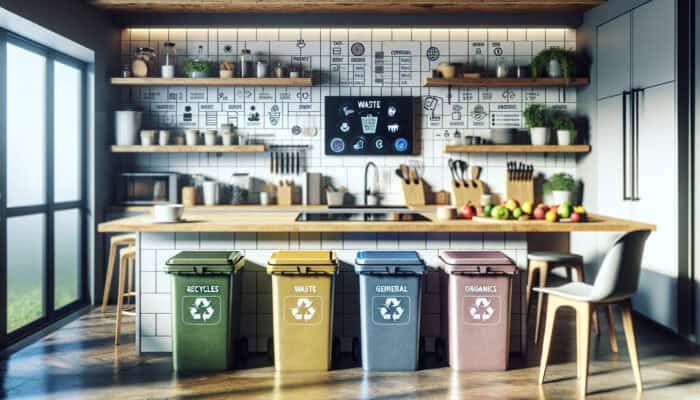Unlocking the Value of Advanced Waste Sorting for Efficient House Clearance in the UK
What Is Advanced Waste Sorting and Why Is It Essential?
Advanced waste sorting for house clearance is a vital process that involves the careful categorization of waste into distinct types, which aids in efficient disposal or recycling activities. This structured system aligns with UK standards and regulations, fostering effective waste management practices. By embracing this method, households throughout the UK can streamline their waste disposal processes while actively supporting local recycling initiatives. The common categories of waste recognized in the UK include:
- General waste
- Recyclables (such as plastic, metal, paper, and glass)
- Organic waste (comprising food and garden waste)
- Hazardous waste (like batteries and chemicals)
- Electrical waste (commonly known as e-waste)
- Bulky items (including furniture and appliances)
- Construction waste (such as building materials)
Understanding these categories is crucial for households aiming to manage their waste effectively and contribute positively towards environmental sustainability.
What Are the Advantages of Adopting Advanced Waste Sorting?
The adoption of advanced waste sorting brings about considerable advantages, primarily by decreasing the amount of waste directed to landfills while simultaneously enhancing recycling rates. This practice is integral to the UK’s environmental strategy, as it conserves valuable resources and mitigates the adverse effects of waste on the ecosystem. The key environmental benefits of advanced waste sorting include:
- Reduction in landfill usage
- Increased recycling rates
- Conservation of natural resources
- Decreased greenhouse gas emissions
- Enhanced soil and water protection
- Support for a circular economy
- Boosted community awareness and education surrounding waste management
By adopting advanced waste sorting techniques, households in the UK can significantly contribute to a sustainable future while minimizing environmental impacts from waste.
What Are the Key Regulations Governing Waste Management in the UK?
The UK has implemented stringent laws and regulations governing waste management, ensuring environmental safety and compliance with established standards. These regulations specify particular waste sorting and disposal methods that households must follow to reduce their ecological footprint. Important regulations include:
- Waste Management Licensing Regulations
- Environmental Protection Act 1990
- Waste Electrical and Electronic Equipment (WEEE) Regulations
- Controlled Waste Regulations
- Household Waste Recycling Act 2003
- Packaging Waste Regulations
- Landfill Tax Regulations
Understanding and complying with these regulations is essential for residents to ensure responsible waste management and align with the government’s broader sustainability goals.
How Can UK Homes Successfully Implement Advanced Waste Sorting?

Effective Household Sorting Techniques for Waste Management in the UK
In UK households, implementing effective sorting techniques is crucial for a successful advanced waste sorting process. Families often adopt strategies that involve separating recyclables from non-recyclables and using color-coded bins that align with local council guidelines. Many councils utilize a three-bin system: one for general waste, another for recyclables, and a third for organic waste. Some highly effective sorting techniques for UK households include:
- Separating waste into specifically designated bins
- Using color-coded bin systems for improved clarity
- Labeling bins to prevent contamination
- Regularly emptying bins to avoid overflow
- Educating all household members about sorting practices
- Employing clear bags for recyclables to enhance visibility
- Establishing a waste sorting station in a convenient location
By adopting these sorting techniques, households across the UK can ensure they are making substantial contributions to effective waste management and actively supporting local recycling efforts.
What Are the Best Practices for Waste Sorting in the UK?
Following best practices for waste sorting in the UK is vital for achieving optimal results and boosting recycling rates. By taking a systematic approach, households can significantly enhance the efficiency of their waste management efforts. Key best practices include maintaining a consistent sorting schedule, utilizing designated bins for various waste types, and adhering to UK waste management protocols. Here are some actionable strategies for UK households to refine their waste sorting practices:
- Creating a routine for waste collection and sorting
- Encouraging all family members to engage in sorting activities
- Keeping waste bins in easily accessible locations
- Utilizing educational resources to inform household members
- Participating in local community recycling programs
- Reviewing local council guidelines for updates on waste sorting
- Implementing composting for organic waste to reduce landfill contributions
By embracing these best practices, UK households can significantly elevate their waste sorting efforts and contribute to a more sustainable environment.
What Essential Tools and Equipment Are Required for Waste Sorting in UK Homes?

To facilitate efficient waste sorting in UK homes, a range of tools and equipment is essential. These resources not only assist in the sorting process but also encourage better waste management practices within the household. Key tools for effective waste sorting in UK homes include:
- Color-coded bins designated for recyclables, general waste, and organics
- Compost bins for organic waste disposal
- Recycling bags for convenient transport of materials
- Shredders for processing paper and cardboard waste
- Labels for clearly identifying distinct waste categories
- Smart bins that notify users when full or in need of disposal
- Waste sorting apps that offer real-time guidelines and tips
Incorporating these tools and equipment into daily routines can significantly enhance the efficiency of waste sorting practices and bolster local recycling initiatives.
Gain Expert Insights on Advanced Waste Sorting for Effective House Clearance
Explore Successful Waste Sorting Initiatives in the UK
Numerous success stories throughout the UK showcase how advanced waste sorting has transformed waste management within various communities. For example, in Bristol, the launch of a comprehensive recycling program has led to a substantial increase in recycling rates, enabling the city to achieve its waste reduction targets. In another instance, the London Borough of Camden initiated a borough-wide campaign to engage residents about the significance of effective waste sorting, resulting in a 30% increase in participation rates in recycling initiatives. These real-world examples highlight the tangible benefits and positive outcomes associated with advanced waste sorting in UK communities.
What Actionable Steps Can UK Residents Take for Effective Waste Sorting?
For UK residents keen to implement advanced waste sorting at home, taking actionable steps is crucial. The process begins with establishing a dedicated sorting station that is easily accessible for all household members. Residents should start by designating specific bins for recyclables, non-recyclables, and organic waste, ensuring that everyone understands the purpose of each bin. Another essential step is educating family members about the importance of waste sorting and how their actions contribute to environmental sustainability. Furthermore, participating in local community events or workshops focused on waste management can enhance understanding and commitment to advanced waste sorting practices.
What Trends Are Emerging in UK Waste Sorting According to Experts?
As environmental awareness continues to grow across the UK, experts predict an increase in the adoption of advanced waste sorting among households. A significant trend is the rising focus on digital solutions, including apps designed to assist residents in adhering to sorting guidelines and waste collection schedules. Moreover, local councils are increasingly collaborating with communities to provide education on waste sorting, emphasizing the importance of resident involvement. Experts also highlight a trend towards reducing single-use plastics as a response to heightened awareness of sustainability issues. As these trends evolve, UK residents are likely to witness a more organized and strategic approach to waste management.
How Is Technology Revolutionizing Waste Sorting in the UK?
Technology is rapidly transforming the waste sorting landscape in the UK, enhancing both efficiency and effectiveness within households. Smart bins equipped with sensors can monitor waste levels and alert users when they require emptying, reducing the risk of overflow and ensuring timely disposal. Additionally, waste sorting apps provide real-time guidelines and tips tailored to local council regulations, simplifying compliance with sorting requirements. The integration of technology into waste management not only streamlines the sorting process but also promotes increased community engagement and participation in recycling efforts.
What Role Does Legislation Play in Shaping Waste Sorting Practices in the UK?
Recent legislation in the UK is driving significant changes in waste sorting practices, encouraging households to adopt more sustainable waste management strategies. For example, the introduction of the Resources and Waste Strategy aims to foster a circular economy, influencing how residents perceive and manage their waste. Furthermore, new regulations targeting single-use plastics and enhancing recycling rates are prompting local councils to improve their recycling services and provide more effective guidance for households. The impact of legislation is evident in the growing awareness and commitment among UK residents to adopt advanced waste sorting practices as an integral part of their daily routines.
What Environmental Benefits Are Associated with Advanced Waste Sorting in the UK?
How Does Advanced Waste Sorting Reduce Landfill Usage?
Advanced waste sorting plays a pivotal role in significantly reducing the quantity of waste sent to landfills in the UK. By effectively categorizing waste into appropriate streams, households can ensure that recyclables are processed correctly, leading to a decrease in the overall volume of waste requiring disposal. This reduction not only preserves valuable land resources but also mitigates the environmental damage associated with landfill sites, such as soil and water contamination. Through advanced waste sorting, UK residents can actively contribute to a cleaner and healthier environment by minimizing landfill usage and endorsing sustainable waste management practices.
What Impact Does Advanced Waste Sorting Have on Recycling Rates in the UK?
One of the most significant effects of advanced waste sorting is the noticeable increase in recycling rates throughout the UK. By promoting effective sorting practices, households can ensure that recyclable materials remain uncontaminated by non-recyclables, resulting in a higher percentage of materials being processed and reused. This boost in recycling rates contributes to resource conservation, as recycled materials can be reintegrated into the manufacturing process, thereby reducing the demand for virgin resources. The focus on advanced waste sorting has encouraged households to actively participate in recycling initiatives, leading to enhanced overall community involvement in waste management.
How Does Advanced Waste Sorting Align with the UK’s Sustainability Objectives?
Advanced waste sorting is intrinsically connected to the UK’s sustainability objectives, fostering a circular economy that reduces environmental impact and conserves resources. By implementing effective waste sorting practices, households contribute to minimizing waste generation and promoting recycling, aligning with governmental goals aimed at achieving net-zero carbon emissions by 2050. This practice not only aids in conserving natural resources but also enhances community awareness regarding responsible waste management, nurturing a culture of sustainability. Through advanced waste sorting, UK residents can actively engage in a broader movement towards environmental stewardship and sustainability.
What Challenges Do UK Residents Face with Advanced Waste Sorting?
How Does a Lack of Awareness and Education Impact Waste Sorting?
A significant challenge facing many UK residents regarding advanced waste sorting is the lack of awareness and education about its benefits and the methods involved. Many individuals remain uncertain about how to appropriately sort their waste, leading to contamination and ineffective recycling processes. To elevate waste sorting awareness in the UK, educational initiatives could be implemented, including community workshops, informational campaigns, and engaging school programs. By providing residents with the necessary knowledge and resources to understand the importance of waste sorting, communities can foster a culture of responsibility and environmental stewardship.
What Space Limitations Affect Waste Sorting Efforts in UK Homes?
Space constraints in UK homes can present challenges when establishing effective waste sorting systems. Many households, particularly those in urban areas, find it difficult to identify suitable locations for multiple bins or composting systems. To address these space limitations, UK residents can explore compact solutions such as stackable bins or integrated waste sorting systems that combine multiple functions. Additionally, utilizing vertical space, such as shelves or wall-mounted bins, can optimize available areas for waste sorting. By innovating within their available space, residents can create efficient systems that support advanced waste sorting practices.
How Do Inconsistent Local Council Guidelines Hinder Waste Sorting?
Inconsistencies in waste sorting guidelines among different UK councils can create confusion for residents and hinder effective waste management practices. The existence of varying rules and regulations regarding what materials can be recycled and how waste should be sorted often leaves individuals struggling to comply with local protocols. To standardize waste sorting guidelines, UK councils can collaborate and establish clearer communication strategies for residents. Providing accessible resources, such as online materials or community workshops, can help ensure that residents are informed about proper waste sorting practices and encourage adherence to local guidelines.
What Research-Backed Benefits Does Advanced Waste Sorting Provide for House Clearance?
How Do Economic Benefits Manifest for UK Households?
Research indicates that advanced waste sorting can yield notable economic benefits for UK households, primarily through reduced waste disposal costs. By effectively sorting waste and increasing the volume of recycled materials, households can lower their total waste volume, which can lead to decreased fees for waste collection services. Additionally, many local councils offer incentives for recycling initiatives, further amplifying financial advantages for residents. Embracing advanced waste sorting not only promotes environmental sustainability but also results in tangible cost savings for households.
What Health and Safety Improvements Can Be Achieved?
Implementing advanced waste sorting practices can significantly enhance health and safety within UK homes. By accurately segregating hazardous waste, such as batteries and chemicals, residents can minimize the risk of exposure to harmful substances. Moreover, reducing clutter through effective waste management cultivates safer living environments, decreasing the likelihood of accidents related to hazardous materials. Advanced waste sorting fosters a cleaner and healthier home, supporting the well-being of all household members.
What Long-Term Environmental Impact Can Advanced Waste Sorting Have?
Studies reveal that advanced waste sorting has a substantial long-term positive impact on the UK environment. By reducing reliance on landfills and increasing recycling rates, advanced waste sorting contributes to a decrease in pollution and resource depletion over time. This sustainable practice supports the preservation of natural ecosystems, promoting biodiversity and environmental resilience. Emphasizing advanced waste sorting benefits not only current generations but also lays the groundwork for a healthier planet for future generations.
How Does Advanced Waste Sorting Enhance Recycling Efficiency?
Advanced waste sorting improves recycling rates by ensuring that materials are accurately separated and processed, leading to more efficient recycling operations in the UK. When recyclable materials are free from contamination, they can be processed more effectively, resulting in higher recovery rates and better-quality recycled products. This efficiency enhances the overall effectiveness of recycling programs, supporting the ongoing circular economy. By prioritizing advanced waste sorting, residents contribute to a more streamlined recycling process that benefits the environment.
What Community and Social Benefits Are Associated with Advanced Waste Sorting?
The implementation of advanced waste sorting can promote community engagement and education on waste management, fostering social responsibility throughout the UK. Community-led initiatives, such as local recycling events or educational workshops, encourage residents to actively participate in waste sorting efforts. These initiatives not only heighten awareness but also cultivate a sense of camaraderie among residents, promoting collaboration towards shared sustainability goals. The social benefits derived from advanced waste sorting contribute to building stronger, more resilient communities committed to responsible environmental practices.
Explore Proven Strategies for Advanced Waste Sorting in House Clearance
How Can Community-Based Waste Sorting Initiatives Foster Engagement?
Community-based initiatives play a crucial role in motivating residents to engage in collective waste sorting efforts. Local councils can organize community clean-up days, recycling drives, or educational workshops that unite residents to learn about best practices for waste management. Such initiatives not only promote awareness but also foster a sense of responsibility towards the environment. By participating in community-based waste sorting initiatives, UK residents can exchange valuable knowledge, resources, and experiences, ultimately leading to improved waste management practices across the community.
What Role Does Technology Play in Enhancing Waste Sorting Efficiency?
The integration of technology into waste sorting can significantly streamline processes for UK households, improving both efficiency and engagement. Smart bins, for instance, can monitor waste levels and alert users when they need to be emptied, minimizing overflow and ensuring timely disposal. Additionally, waste sorting apps can provide customized guidance on local recycling guidelines and reminders for waste collection days. By embracing technology in waste sorting practices, UK residents can enhance their waste management efforts and cultivate a culture of sustainability within their households.
How Can Engaging with Local UK Waste Management Services Improve Practices?
Actively engaging with local waste management services can equip UK residents with valuable resources and guidance on advanced waste sorting. Local councils often provide educational materials, workshops, and community initiatives aimed at supporting residents in their waste management endeavors. By proactively seeking information and participating in local programs, households can stay informed about the latest recycling initiatives and best practices. This engagement not only benefits individual households but also strengthens a community-wide commitment to responsible waste management.
Frequently Asked Questions
What is advanced waste sorting?
Advanced waste sorting refers to the process of categorizing waste into distinct types for efficient disposal or recycling, in alignment with UK standards and regulations.
What benefits can be derived from advanced waste sorting?
Benefits include decreased landfill utilization, increased recycling rates, conservation of natural resources, and reduced greenhouse gas emissions.
What are the main waste categories recognized in the UK?
Common waste categories comprise general waste, recyclables, organic waste, hazardous waste, electrical waste, bulky items, and construction waste.
How can households in the UK enhance their waste sorting practices?
Households can improve their practices by establishing regular sorting schedules, utilizing designated bins, and educating family members about waste management.
What essential tools are needed for effective waste sorting in UK homes?
Essential tools encompass colour-coded bins, compost bins, recycling bags, shredders, and waste sorting apps.
How does advanced waste sorting contribute to reduced landfill use?
By accurately categorizing waste, households can ensure that recyclable materials are processed appropriately, leading to diminished contributions to landfills.
What effect has advanced waste sorting had on recycling rates in the UK?
Advanced waste sorting has resulted in a significant increase in recycling rates, fostering resource conservation and minimizing environmental impact.
What challenges do UK residents face regarding waste sorting?
Challenges include a lack of awareness, space limitations for sorting systems, and inconsistent guidelines from local councils.
What long-term environmental impacts arise from advanced waste sorting?
Long-term impacts include reduced pollution, resource conservation, and improved ecosystem health, promoting sustainability for future generations.
How can technology improve waste sorting in UK households?
Technology can enhance waste sorting through smart bins that monitor waste levels and waste sorting apps that provide real-time guidance on local regulations.
Connect with us on Facebook!
The Article: Advanced Waste Sorting for House Clearance: UK Guide Was First Found At https://birminghamhouseclearance.com
The Article Advanced Waste Sorting: A Comprehensive UK House Clearance Guide Was Found On https://limitsofstrategy.com

